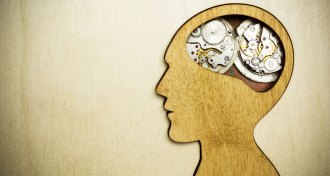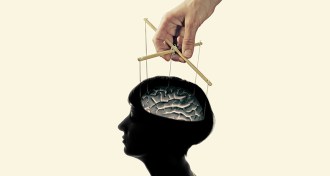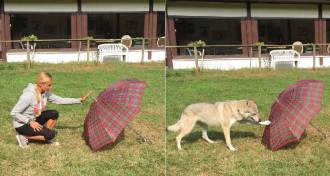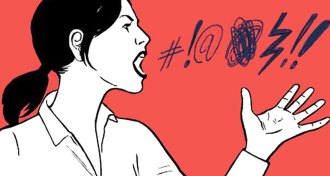Psychology
-
 Neuroscience
NeuroscienceMysteries of time still stump scientists
The new book "Why Time Flies" is an exploration of how the body perceives time.
-
 Psychology
PsychologyLong-lasting mental health isn’t normal
Those who stay mentally healthy from childhood to middle age are exceptions to the rule.
By Bruce Bower -
 Psychology
PsychologyYou’ve probably been tricked by fake news and don’t know it
In the fight against falsified facts, the human brain is both the weakest link and our only hope.
-
 Animals
AnimalsDogs form memories of experiences
New experiments suggest that dogs have some version of episodic memory, allowing them to recall specific experiences.
-
 Psychology
PsychologyLearning curve not so smooth
Preschoolers tend to reach a milestone of social thinking after months of fits and starts.
By Bruce Bower -
 Health & Medicine
Health & MedicineTraining for parents may lessen some autism symptoms in kids
Training parents may help with some autism symptoms, a new study suggests.
-
 Psychology
PsychologyErasing stigma needed in mental health care
Social forces drive those in need away from mental health care.
By Bruce Bower -
 Psychology
PsychologyChimps, other apes take mind reading to humanlike level
In a first, apes show that they understand when others hold false beliefs.
By Bruce Bower -
 Anthropology
AnthropologyBig Viking families nurtured murder
Vikings in Iceland got a murderous boost from having large extended families.
By Bruce Bower -
 Humans
HumansCognitive scientist puts profanity in its place
Swearing provides unappreciated insights into human thought and language, a cognitive scientist argues in the new book What the F.
By Bruce Bower -
 Tech
TechReaders respond to terrorism’s roots
Readers respond to the July 9, 2016, issue of Science News with questions on terrorism, dog evolution and more.
-
 Science & Society
Science & SocietyEmpathy for animals is all about us
We extend our feelings to what we think animals are feeling. Often, we’re wrong. But anthropomorphizing isn’t about them. It’s about us.